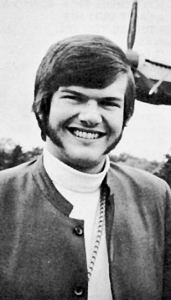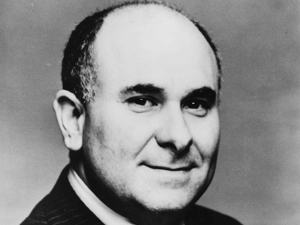MEMORIES OF THE BIG 8 — Big Jim Edwards — PART 2
1968-1969
“WITH A NASAL VOICE LIKE THAT, YOU’LL NEVER MAKE IT”
By JIM DAVIS
(MCRFB Note: Before starting — missed PART 1? Please go here) —
Paul Drew was a disciplinarian. He worked hard, walked fast, listened to his station intently, listened to the competition, expected the best from his staff, would not accept mediocrity, and was constantly chewing on the end of a magic marker. Because of the union at the station, the DJ’s didn’t run their own consoles. That position was occupied by “T.T. ops” (Turn-table operators). His tolerance for a bad “op” was measured in seconds. The best of the ops were for the most part frustrated disc jockeys. Some of them were fantastic….others, not so.
During my 3 years at the station I watched 43 men (no female ops) come and go from their positions. Most of them were T.T. ops that either were fired or quit under the extreme pressure.
Paul expected his jocks to be at the station one hour prior to the air-shift to prepare. That meant reading over the memorandum of instructions (there were many), reviewing alterations to the playlist, practicing live copy, and generally getting “psyched up” to kick the Big 8 in gear.

One winter morning, I had a dead battery which delayed my usual 45 minute drive from Farmington to Windsor by 15 minutes which meant that I would be arriving at the station only 45 minutes prior to my show. Paul checked with the guard gate and found that I was late in arriving. And in a quick phone call, he alerted me that he mandated one hour of preparation time, and that I was not to go on the air until 6:15AM. I wonder today if any program director cares enough to demand their air talents “best effort”?
Paul also had high expectations of himself. He never punched a clock; many times arriving at the station in the wee small hours of the morning. He had a transistor radio with him at all times and rarely missed a set. After doing the all night show for a couple of months when Billy Mack (Kris Eric Stevens) resigned, I was convinced Paul never slept.
The porch lamp in the studio known as the “Batphone” was connected to the PD’s private phone line. If the lamp lit, you could count on the fact that an error had been made. However, Paul always handled the calls with diplomacy and as a professional.
I never heard him raise his voice, although he could be very direct, and sometimes cutting. Example: There was a Mike Rivers “groupie” named Susan who desperately wanted to be the first female Big 8 jock. One day, she was in the lunch room at the station when Paul cruised through. I stopped him and introduced him to Susan. In a burst of energy she said “I’d really like to work here at the Big 8.” Paul’s response: “With a nasal voice like that, you’re wasting your time. You’ll never make it” and without missing a step, he continued walking into the music library. She was crushed. But, in less than 5 seconds he had told her the truth (the rest of us couldn’t). She didn’t have what it took to make it, and was not Big 8 material. Sometime, the truth hurts.
Paul made sure that his jocks got exposure and were always in the limelight. I met many of the Motown artists; MC’d at the (still) popular Roostertail (Paul was friends with the owners, the Tom and Jerry Schoeniths). I even got to host the Robin Seymour “Swingin Time” TV dance show on Channel 9. And, in a highlight I’ll never forget, I got to DJ an elite socialite dance for (a then young) Edsel Ford.
1968 was a busy year. Detroit was still reeling from the riots a year earlier. The Vietnam War took a swing with the Tet Offensive. Martin Luther King was murdered in April. Two months later, Robert F. Kennedy lost his life. And the Detroit Tigers took home the 1968 Pennant as Denny McLain in 1968 became the last pitcher in Major League Baseball to win 30 or more games during a season (31–6) — a feat accomplished by only thirteen players in the 20th century.
Each of these stories were brought to life by CKLW 20/20 news headed up by Dick Smythe who took his news as seriously as Paul Drew took his programming. At one point, CKLW news employed 27 people. Dick taught his people to write with flair utilizing colorful adjectives and descriptive adverbs. The news was full of alliteration and sometimes extremely graphic. I’m convinced that CKLW news was a “tune-in” rather than a “tune-out.”

Paul Drew and his team had brought unmatched success to the Big 8. Within a few months, the competition had been leveled. It was game over for WXYZ and WKNR. Meanwhile, CKLW gained number one status not only in Detroit, but in distant markets like Erie, PA; Fort Wayne, IN; Cleveland, OH; and even my beloved Toledo where I had cut my teeth for the Big 8.
One afternoon in ‘68, Paul called an “all staff” meeting which was his one and only during my time with him. He announced “it was time to go play pool on a bigger pool table.” He was exiting to join the Storer operation in Philly and would be running WIBG.
There was a huge let-down as the news filtered throughout the building. Could we sustain the amazing growth and level of professionalism the station had achieved? Only time would tell.
Gary Mack (MacDowell) who was highly respected in the Drake-Chenault organization would fill the gap temporarily until Jim O’Brien (Oldham) arrived. Jim had stints with Drake at KHJ, Los Angeles and WOR-FM in New York. Jim was an intense, and serious person, dedicated to his own personal success, as well as the company he was working for. He had a voice as big as the State of Texas, where he was born in. He had a young daughter Peri Gilpin (Oldham) that went on to have a famous career of her own as the character Roz on the Frasier television show.
Tragically, Jim was killed in 1983 during a parachute dive while saving the life of another skydiver. Jim’s stay at the Big 8 was brief. He was followed by Captain Showbiz Ted Adkins who brought a sense of camaraderie back to the station. However, Ted was needed in San Francisco at KFRC. All of these changes happened within a year. The Big 8 needed a leader…. And at just the right time, like magic…. Paul Drew returned. CKLW was in capable hands again.
___
(Second of 3 parts, to be continued; – Part 3 — Tuesday, July 28, 2015)
A MCRFB Note: Jim Edwards, CKLW
___
Motor City Radio Flashbacks recently heard from Jim Davis (July 9, 2015), the former Big 8 jock known as ‘Big Jim’ Edwards on CKLW. A special ‘THANK YOU’ goes out to Jim Davis for sharing his Big 8 recollections with us — today — exclusively here on MCRFB.COM. The SECOND of a three part series, we will publish the THIRD and final part of Jim Davis’ CKLW memories he authored, entitled, “1970,” next Tuesday, July 28, 2015.
Missed Part 1? GO HERE.
![]()


